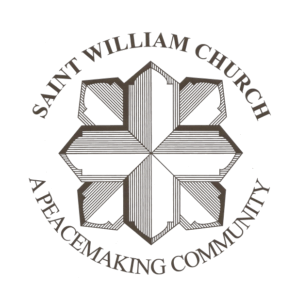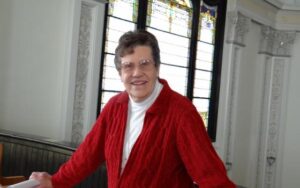The Spirit’s Power

By Anne Hansen
This past Sunday, I served as a lector for my faith community and read aloud the powerful words that Jesus speaks to his friends just before his ascension into heaven: “You will receive power when the Holy Spirit comes upon you, and you will be my witnesses…to the ends of the earth” (Acts 1:8).
These words are as clear today as then. It is the power of the Holy Spirit — and the hope the Spirit offers — that keeps many of us returning week after week to the liturgical celebrations of our faith communities.
The world has changed dramatically since the time of Jesus, but human hearts have not. We still long for the love of God. We still hold that loving each other and caring for the least among us is a priority. We still carry hope that our Church will grow in numbers and the inclusivity that Jesus modeled. We are disciples.
Yet sometimes it feels we are still waiting in the Upper Room for the arrival of the Holy Spirit.
When the Gospel was proclaimed on Sunday, I had to step aside. As a woman, I am not permitted to read those words — or preach on them — in the context of the Mass. As the deacon read the Gospel, I looked around and wondered if anyone else noticed this exclusion.
In the second reading, we heard in St. Paul’s Letter to the Ephesians that “grace was given to each of us…some as apostles, others as prophets, others as evangelists, others as pastors and teachers, to equip the holy ones for the work of ministry, for building up the body of Christ” (4:7, 11-12).
We know that women have served in these roles throughout history. In just one section of the Letter to the Romans, St. Paul refers to Phoebe as a minister (diakonos) of the church at Cenchreae, Prisca as a “co-worker in Christ Jesus” who risked her neck for Paul’s life, and Junia as a fellow prisoner who is “prominent among the apostles” (16:1-7).
And we know that women continue to serve in these roles today. I’m excited that Discerning Deacons is telling the stories of these women who are bearing witness to Christ “to the ends of the earth” — in parishes in the United States, in the remotest places of the Amazonian territory — and on so many other frontiers.
I hope you’ll consider how you might be called to participate in the Church’s discernment of women and the diaconate. Do you have a prayer or hope to share? Are you a Catholic woman in ministry with a story to share? Do you want to invite others into the conversation by hosting a “house meeting” or parish dialogue on the topic?
Providentially, on Pentecost Sunday, there is a training to help equip you to host such conversations. Inscríbete aquí to join us this Sunday, May 23, from 3-6 p.m. ET. And let us pray together, once again, for the coming of the power of the Holy Spirit.
Anne Hansen, the executive director of Ignatians West, is a speaker, retreat director and workshop facilitator. Anne has an MA in Pastoral Theology from Loyola Marymount University and an MA in Educational Psychology from California State University, Northridge. She is married with five children and nine grandchildren.


